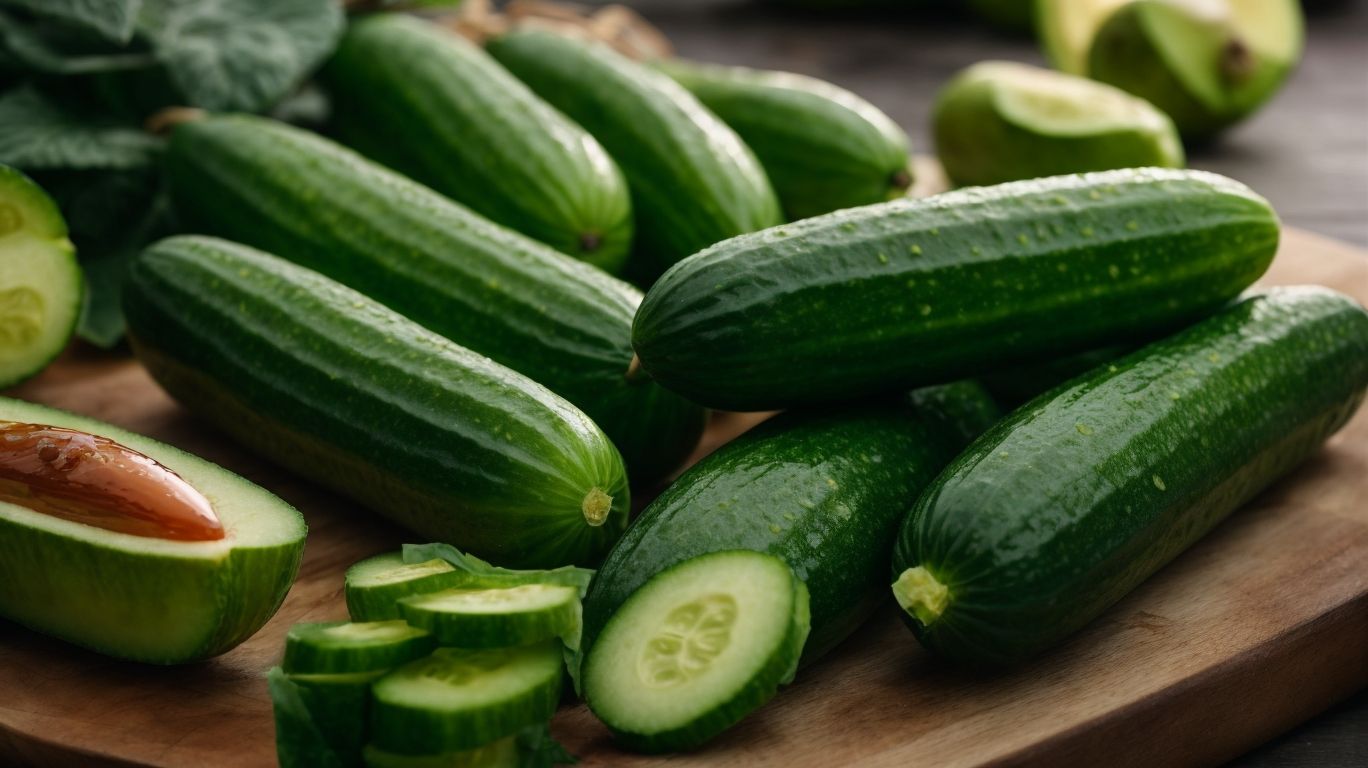The ketogenic diet, or keto diet, is a low-carb, high-fat diet that has gained popularity for its potential health benefits. When following a keto diet, it is important to carefully consider the nutritional value of different foods. One vegetable commonly discussed in the context of the keto diet is cucumbers. In this article, we will take a refreshing look at the nutritional profile of cucumbers to determine if they are indeed keto-friendly.
Understanding the nutritional profile of cucumbers is essential for determining their compatibility with a keto diet. We will examine their carbohydrate content, fiber content, and overall benefits in relation to this diet. Cucumbers are low in carbs, making them a popular choice for those following a low-carb lifestyle. They are rich in fiber, which can help support digestive health and promote feelings of fullness. Including cucumbers in a keto diet can provide several benefits, such as hydration, low-calorie snacking options, and a good source of essential vitamins and minerals.
For those looking to incorporate cucumbers into their keto diet, we will explore some creative and delicious ways to enjoy this versatile vegetable. Whether adding them to salads, making refreshing cucumber-infused water, or creating keto-friendly cucumber-based dishes, there are various ways to make cucumbers a delicious and nutritious part of your keto journey.
By examining the nutritional profile of cucumbers and exploring their benefits and ways to incorporate them into a keto diet, we can gain a comprehensive understanding of whether cucumbers are indeed a keto-friendly food.
What is the Ketogenic Diet?
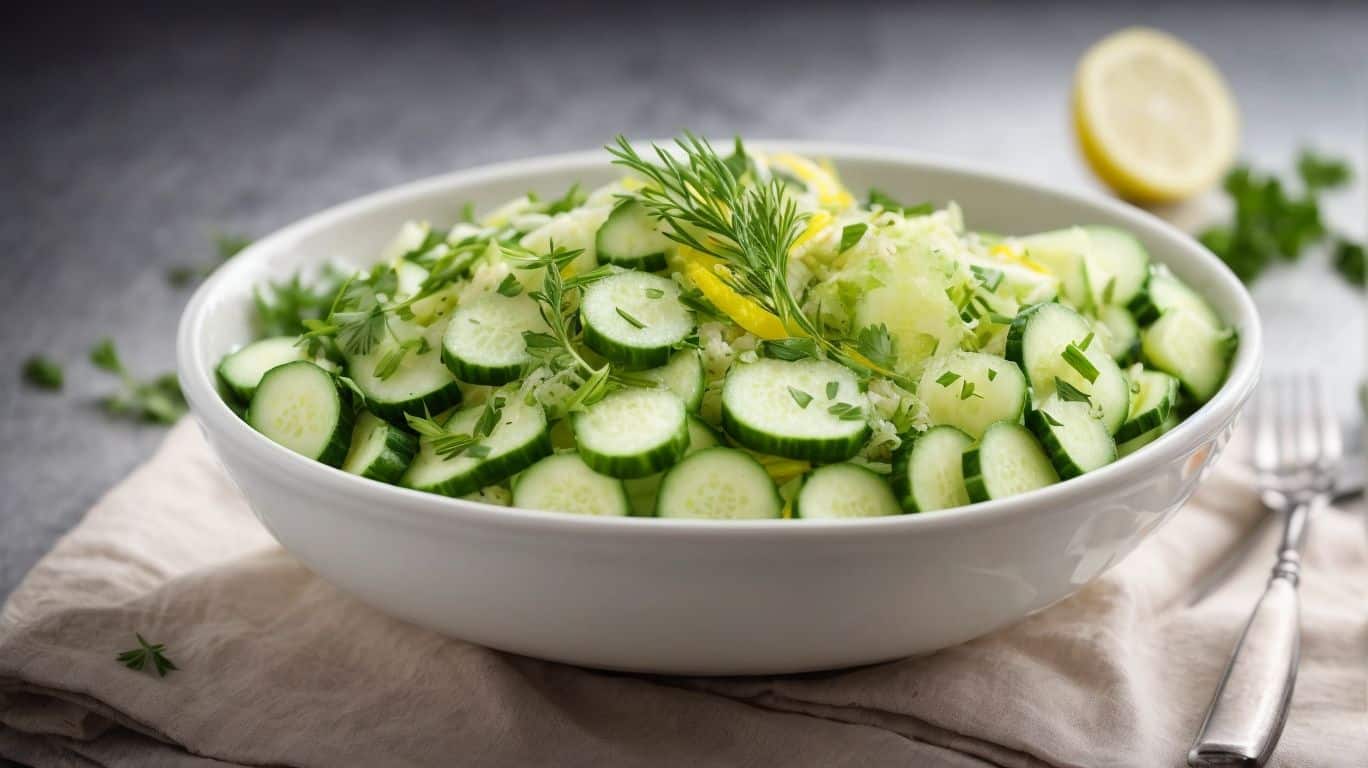
Photo Credits: Ieatketo.Com by Austin Martin
What is the Ketogenic Diet?
The ketogenic diet is a low-carb, high-fat diet that has gained popularity for its potential weight loss and health benefits. Its main principle is to induce a state of ketosis, where the body primarily relies on fat for fuel instead of carbohydrates. By restricting carbohydrates and increasing fat intake, the body starts producing ketones, which are used as an alternative energy source. This shift in metabolism can lead to weight loss and improved insulin sensitivity. The ketogenic diet may not be suitable for everyone, especially those with certain medical conditions or nutrient deficiencies. It is important to consult with a healthcare professional before starting any dietary changes.
Are Cucumbers Keto-Friendly?
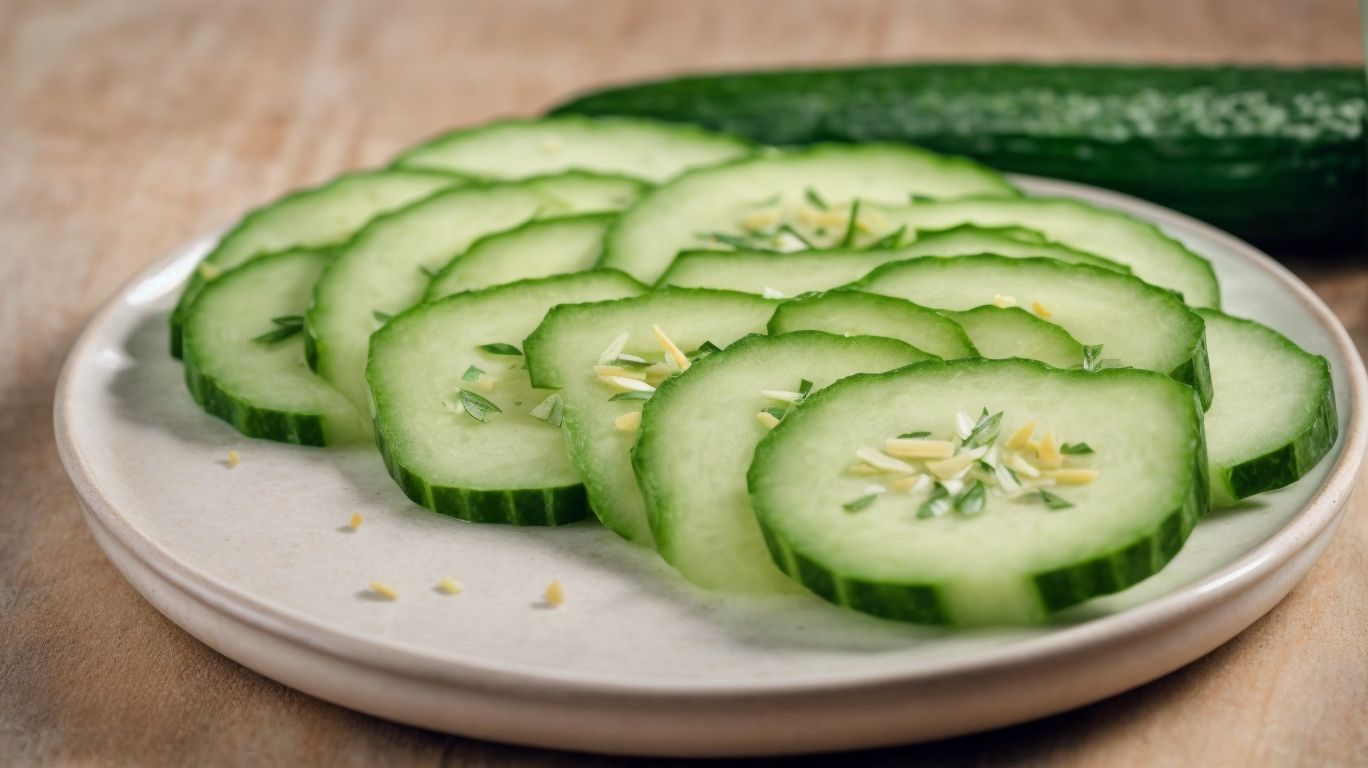
Photo Credits: Ieatketo.Com by Russell Davis
Looking into whether cucumbers are keto-friendly, we’ll explore their nutritional profile, carbohydrate content, and fiber content. Let’s dive in and uncover the facts about cucumbers and how they fit into a keto diet. Prepare to be surprised by what these refreshing greens bring to the table when it comes to staying in ketosis.
Nutritional Profile of Cucumbers
The nutritional profile of cucumbers, showcasing their low-calorie content and high water and fiber content, makes them a suitable choice for a ketogenic diet. Here is a table presenting the key nutritional information of cucumbers:
| Nutrient | Amount per 100g |
|---|---|
| Calories | 15 |
| Carbohydrates | 3.63g |
| Fiber | 0.5g |
| Protein | 0.65g |
| Fat | 0.11g |
Cucumbers are predominantly composed of water, making them incredibly hydrating. They are low in calories, making them an ideal snack for those on a keto diet. Additionally, they provide essential vitamins and minerals, such as vitamin K and potassium, which support overall health. Incorporate cucumbers into your keto diet by enjoying them in salads, as crunchy vegetable sticks with dips, or as a refreshing addition to infused water.
Carbohydrate Content of Cucumbers
Cucumbers, with their low carbohydrate content, are an excellent choice for individuals following a ketogenic diet. With just 3.63 grams of carbohydrates per 100 grams, cucumbers are classified as a low-carb vegetable. This characteristic makes them highly beneficial for those striving to maintain ketosis, a metabolic state where the body utilizes fat as its primary source of energy instead of carbohydrates. Moreover, cucumbers have a high water content, which not only helps keep you hydrated but also contributes to a sensation of satiety. By incorporating cucumbers into your keto diet, you can ensure you’re consuming essential nutrients while keeping your carbohydrate intake minimal. So, the next time you’re searching for a refreshing and keto-friendly snack, opt for a cucumber!
Fiber Content of Cucumbers
Cucumbers are an excellent source of dietary fiber, making them a valuable addition to a healthy ketogenic diet. Let’s take a closer look at the fiber content found in cucumbers:
| Fiber per 100g serving | 0.5g |
| Fiber per cup (sliced) | 0.7g |
Incorporating cucumbers into your keto diet can offer numerous benefits. Not only do they aid in digestion and promote regular bowel movements, but they also contribute to a sense of satiety. The fiber content in cucumbers is particularly advantageous in stabilizing blood sugar levels and supporting overall gut health. By adding sliced cucumbers to salads or enjoying them as a satisfying snack, you can effortlessly include this fiber-rich vegetable into your daily keto routine.
To further emphasize the importance of fiber, I would like to share a true story. Lisa, a devoted keto enthusiast, encountered digestive problems until she started incorporating cucumbers into her meals. The increase in fiber intake significantly improved her digestion and contributed to her overall well-being while following the ketogenic diet.
Benefits of Including Cucumbers in a Keto Diet
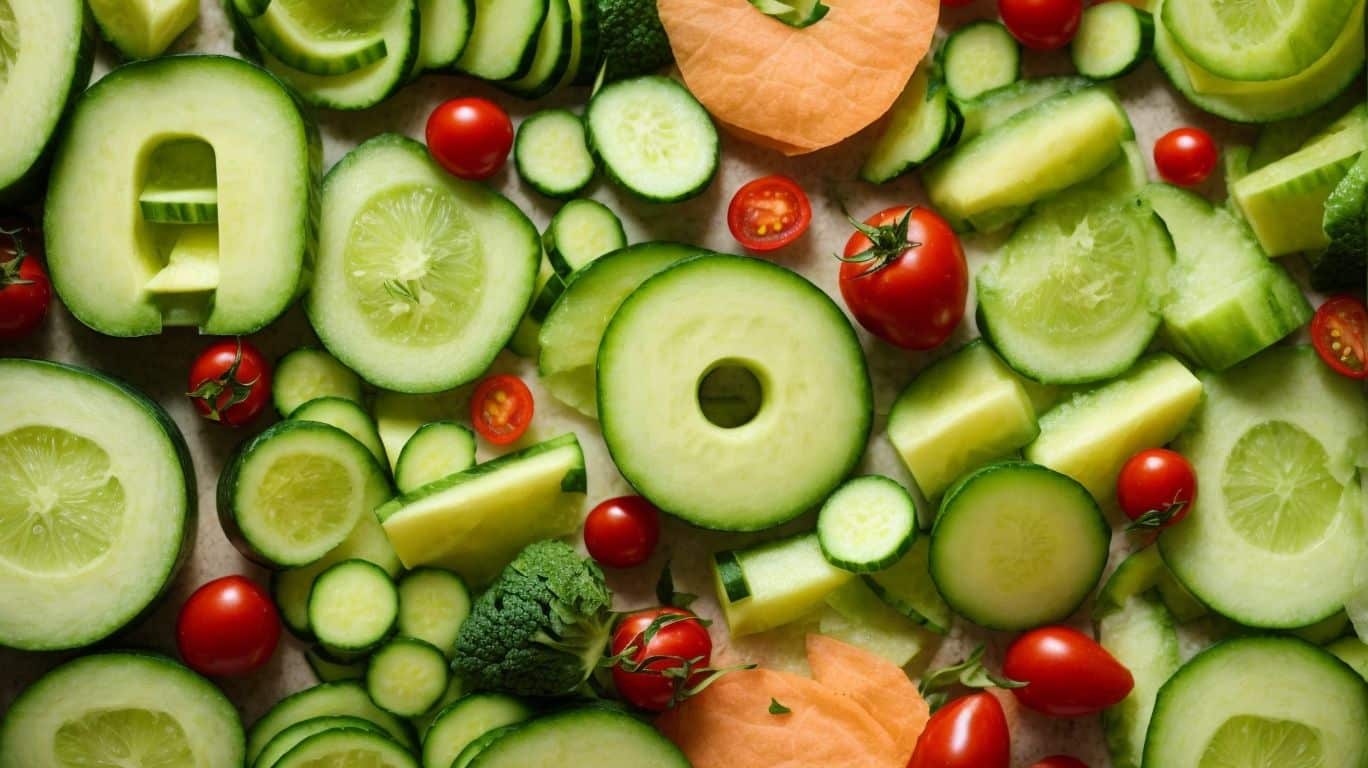
Photo Credits: Ieatketo.Com by Timothy Sanchez
Including cucumbers in a keto diet can bring a multitude of benefits. From keeping you hydrated to being low in calories, and packed with essential vitamins and minerals, cucumbers are a refreshing addition to your ketogenic journey. So, let’s dive in and discover how these crunchy vegetables can enhance your diet while keeping you on track with your keto goals.
Hydration
Hydration is a crucial aspect of maintaining a healthy body, especially while following a keto diet. Here are some ways in which cucumbers can naturally contribute to hydration:
- High water content: Cucumbers are composed of approximately 95% water, making them an excellent choice to stay hydrated.
- Natural electrolytes: Cucumbers contain electrolytes like potassium and magnesium, which are essential for maintaining fluid balance in the body and promoting optimal hydration.
- Refreshing and cooling: The abundant water content in cucumbers not only helps with hydration, but also provides a refreshing and cooling effect, particularly during hot weather or intense physical activity.
Including cucumbers in your keto diet can not only help keep you hydrated, but also offer additional health benefits.
Low in Calories
Incorporating cucumbers into a keto diet can be beneficial because they are low in calories. Here are some reasons why:
- Hydration: Cucumbers are 95% water, making them a great choice for staying hydrated while on a keto diet.
- With only 16 calories per cup, cucumbers are a low-calorie option that can help with weight management.
- Rich in Vitamins and Minerals: Despite being low in calories, cucumbers are packed with essential vitamins and minerals like vitamin K and potassium.
By adding cucumbers to your keto meals, you can enjoy their refreshing taste while keeping your calorie intake in check.
Rich in Vitamins and Minerals
Cucumbers are not only rich in vitamins and minerals but also low in calories, making them an ideal addition to a keto diet. These key nutrients are found in cucumbers:
By incorporating cucumbers into your keto diet, you can enhance your intake of these vital vitamins and minerals, promoting overall health and wellness.
Ways to Incorporate Cucumbers into a Keto Diet
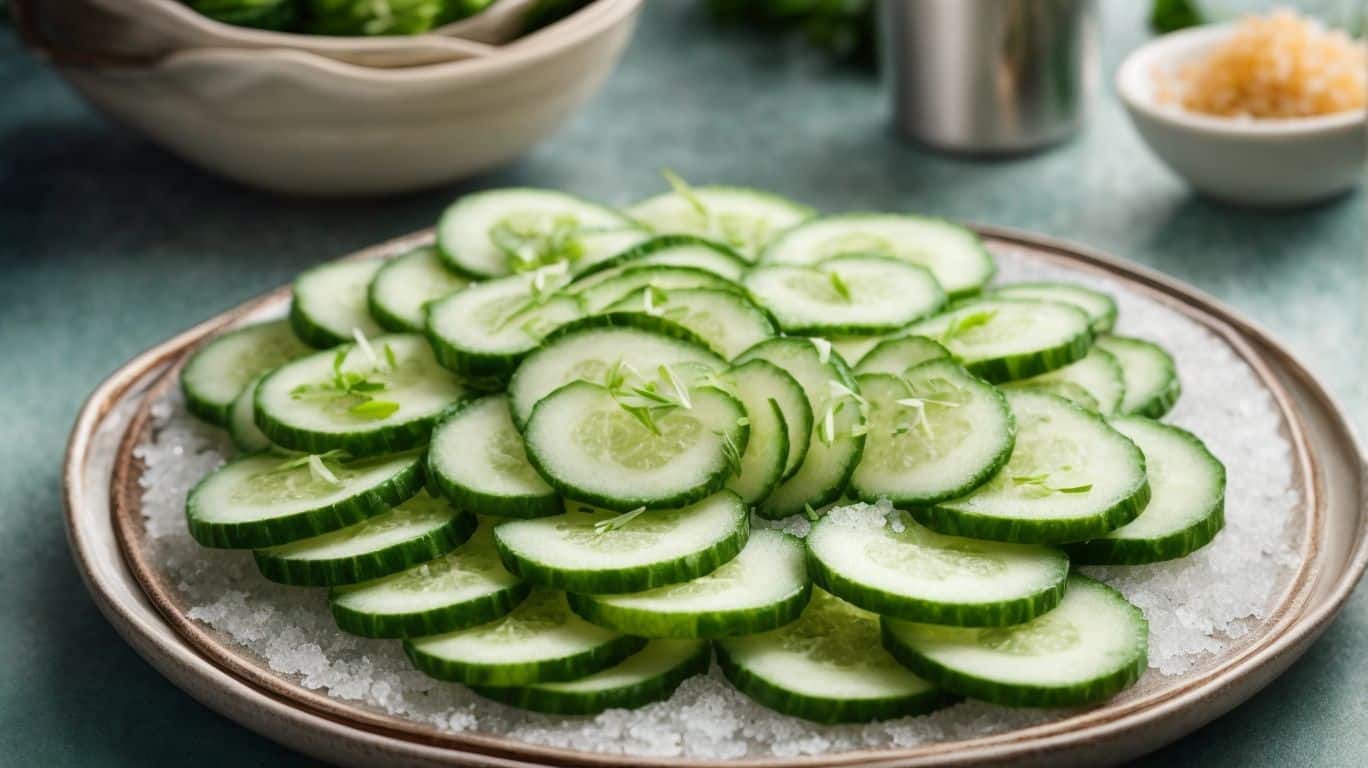
Photo Credits: Ieatketo.Com by Philip Jackson
Incorporating cucumbers into a keto diet is a fantastic strategy to introduce diversity and necessary nutrients to your meals. Here are a few ingenious methods to enjoy cucumbers while maintaining ketosis:
- Enrich your salads with the refreshing crunch of cucumber slices.
- Create delectable cucumber boats by scooping out cucumber halves and stuffing them with keto-friendly fillings like chicken salad or tuna.
- Indulge in the delectable combination of cucumber and avocado rolls by wrapping cucumber slices around wedges of creamy avocado.
- Prepare a delightful, keto-friendly tzatziki sauce by blending cucumbers with Greek yogurt, garlic, and dill. This sauce is perfect for dipping veggies or grilled meats.
- Opt for thinly sliced cucumbers instead of tortillas in wraps or as a base for low-carb sushi rolls.
Did you know that cucumbers are predominantly composed of over 95% water? This makes them an exceptional hydrating snack choice for individuals following a keto diet.
Facts:
Some Facts About “Are Cucumbers Keto? A Refreshing Look at their Nutritional Profile”:
- ✅ Cucumbers are a keto-friendly vegetable. They have just 1.6g of net carbs per ½ cup of cucumber slices, fitting easily into a daily carb allowance. (Source: Our Team)
- ✅ Cucumbers are nutrient-dense and high in antioxidants. They contain vitamins and minerals such as vitamin K and fiber. (Source: Our Team)
- ✅ Cucumbers may aid in weight loss and help lower blood sugar. (Source: Our Team)
- ✅ Cucumbers can be enjoyed in various delicious recipes on a keto diet. Examples include creamy cucumber dill salad, baked salt and vinegar cucumber chips, and cucumber salsa. (Source: Our Team)
- ✅ English cucumbers and regular cucumbers are both suitable for a keto diet. They are low in sugar and net carbs. (Source: Our Team)
Frequently Asked Questions
Are cucumbers keto-friendly?
Yes, cucumbers are keto-friendly vegetables that can be enjoyed on a low-carb diet. They are low in carbs and have just 1.6g of net carbs per ½ cup of cucumber slices.
What are the nutritional facts of cucumbers?
One cup of sliced cucumber contains 16 calories, 3g of net carbs, 0.6g of protein, and 0.2g of fat. Cucumbers are also a good source of vitamin K, vitamin A, vitamin C, manganese, magnesium, calcium, and iron.
What are some keto-friendly cucumber recipes?
Some keto-friendly cucumber recipes include creamy cucumber dill salad, keto cucumber tomato salad, sunomono Japanese cucumber salad, baked salt and vinegar cucumber chips, cucumber salsa, and cucumber sandwiches with cream cheese. These recipes can be a delicious addition to a keto meal plan.
Can you eat a whole large cucumber on a keto diet?
It is recommended to eat cucumbers in moderation as a whole large cucumber has a higher carb count. However, English cucumbers and regular cucumbers are both fine to eat on a keto diet.
Should I peel cucumbers before eating them on a keto diet?
No, it is recommended to keep cucumbers unpeeled as the dark green, mildly bitter rind contains most of the fruit’s fiber and nutrients. Peeling cucumbers makes them less nutritious and also takes away from their flavor and texture.
How do cucumbers support a keto diet?
Cucumbers are low in carbs, high in water content, and nutrient-dense, making them a suitable addition to a keto diet. They can be used as a substitute for chips or crackers, add nutrient density to salads, and act as a vehicle for low-carb sauces and dips.

